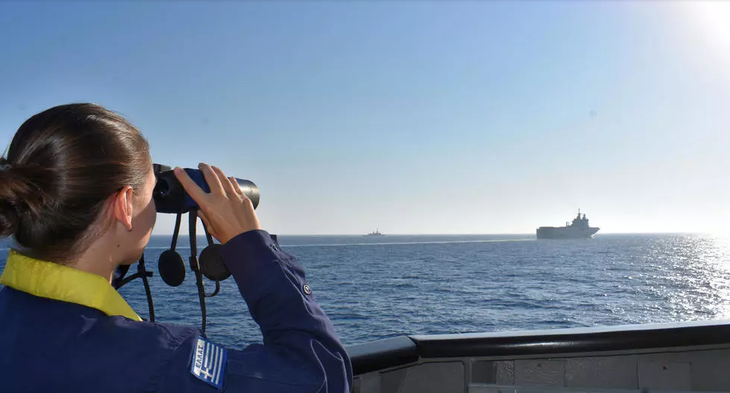(VOVWORLD) - Tensions between Greece and Turkey flared up in the Eastern Mediterranean waters in mid August and have continued to worsen, possibly becoming a serious crisis in the region.
 Warship of Greece during maneuvers in the Mediterranean Sea (Photo: Reuters/ Ministry of Defense of Greece) Warship of Greece during maneuvers in the Mediterranean Sea (Photo: Reuters/ Ministry of Defense of Greece) |
A row between Greece and Turkey, two NATO members, occurred after the Limnos, an elderly Greek frigate, and the Kemal Reis, one of the Turkish five escorts sent to protect the Oruc Reis oil exploration ship, clashed on August 12 in the waters of the Eastern Mediterranean, where both countries have claimed jurisdiction right.
Turkey strongly reacted to the incident saying it was Greece’s provocation. Tension has escalated and peaked when both countries simultaneously conducted military exercises with their partners in the Mediterranean in late August.
Reaction from the EU and NATO
The US and EU have tried to prevent rising tensions. On August 14th the EU held an urgent Foreign Ministers’ meeting of member countries to discuss the situation. They agreed that Turkey’s naval mobilization could spark a wider military confrontation. US President Donald Trump and French President Emmanuel Macron talked over the phone, expressing their concern over increased tension between NATO Allies.
NATO Secretary General Jens Stolltenberg talked on the phone with Turkish President Recep Tayyip Erdogan on August 28th, calling on both Turkey and Greece to ease tensions and resolve the dispute in the spirit of unity and respect for international law. He said earlier that NATO considered measures to prevent possible accidents in the future.
German Foreign Minister Heiko Maas had shuttlecock visits to Athens and Ankara as a mediator trying to ease tension between the two countries.
Besides calls for conciliation, the EU showed a tough stance on the matter. EU High-representative in charge of security and external policies, Josep Borrell, said the EU will discuss punishments for Turkey at the EU Summit scheduled on September 24th.
A complicated competition for natural resources
Analysts say tensions in the Mediterranean have raised global concerns because it involves many countries, not only Greece and Turkey.
A report in 2010 by the US Geological Survey showed that the Levant Basin, east of the Mediterranean, has huge crude oil and gas reserves, estimated at 3.5 trillion cubic meters and 1.7 billion barrels of crude oil. The huge reserve has caused a fierce competition among countries including Greece, Turkey, Egypt, Cyprus, and Israel. Among them Greece, Cyprus, Egypt, and Israel have cooperated with each other, while Turkey is exploiting on its own.
Ankara aimed to change the situation by sending the Oruc Reis oil exploitation ship and escort ships to the eastern sea of the Mediterranean on August 10th, which clashed with a Greek ship.
Analysts said it’s difficult to resolve the Mediterranean conflict in a short time, especially when Turkey refuses to concede. Meanwhile the EU will find it hard to put pressure on Turkey as Ankara holds the key card of “migrants” in important negotiations with the EU.